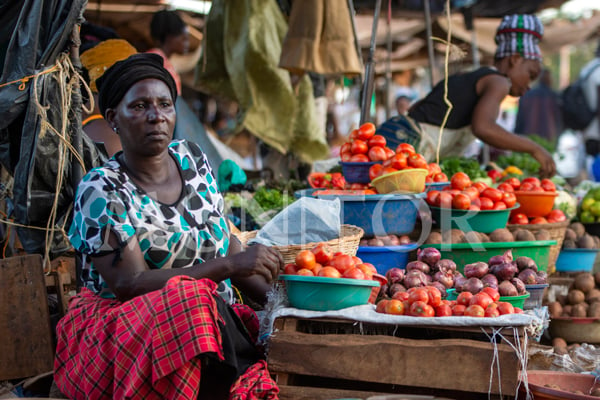Prime
Lower spending triggers shortfall

Ms Zuraika Nakanjakko, a vendor at Busega Market in Kampala, waits for customers at her stall on March 6. MPs opine that lower consumption is, among other things, a sign of weak economic conditions. PHOTO/MICHAEL KAKUMIRIZI
What you need to know:
- According to the report on the Appropriations Bill, 2030, which the House passed on May 18, the government was able to collect Shs11.6 trillion of the expected Shs11.7 trillion.
A less-than-expected rebound in economic activities and government spending lowered tax collections from key earners, forcing a Shs94.8 billion deficit in tax earnings the government planned to collect in the first half of the financial year ending June 30.
According to the report on the Appropriations Bill, 2030, which the House passed on May 18, the government was able to collect Shs11.6 trillion of the expected Shs11.7 trillion.
The House report attributes the government’s slow implementation of development projects—characterised by limited releases in the first quarter for development spending—to the lower-than-expected income collection, particularly in the construction industry.
Despite the less-than-expected showing, Parliament is optimistic that the government is on course to meet the revenue targets in the current financial year.
One of the major sources of revenue for the government is income taxes, including taxes on employment income, business income, and property income. Against its projection of Shs3.904 trillion, the government performed well after registering a surplus of Shs84.7 billion from Shs3.989 trillion collections.
Major surpluses are registered in Pay As You Earn (Paye), casino tax, rental tax, and tax on bank interest. The surplus on Paye, for one, was on account of payment of bonuses and higher salaries in the private sector, rebound of private sector activities after the Covid-19 pandemic.
Elsewhere, the shortfall in corporate income tax is attributed to the lower level of profitability in the transport, storage, and communication activities as a result of various economic shocks. The aforesaid shocks include higher inflation and depressed demand that have negatively affected enterprises.
Corporate tax revenue, nevertheless, grew by 16.6 percent, thanks to the improvement of profitability of firms in various industries.
Higher tourism activities contributed to a surplus of revenue collection from the hotel industry, for example, while a deficit in withholding taxes is largely attributed to a decline in government payments arising from general budget cuts in some institutions
Utilities, including water and electricity, registered major deficits attributed to a decline in consumption due to vandalism or illegal consumption or nonpayment of utilities on time.
The construction sector was not as vibrant as envisaged, especially from projects as demand for cement also suffered, leading to a lower collection of Value Added Tax (VAT) on cement and construction activities. The transport and communication sector was largely affected by the rise in fuel prices and inflation that affected the consumption of those services.
Consumption taxes
The country realised a deficit of Shs211.9 billion in excise duty and VAT collections, with major deficits registered under commodities like beer, cement, sugar, bank charges, soft drinks, and phone talk time.
Major surpluses were only registered under spirits, hotels, and restaurants.
“It should be noted that the utility industry registered deficits in water (Shs7.4 billion) and electricity (Shs14.5 billion). This partly points towards a decline in consumption of utilities arising from vandalism or illegal consumption or non-payment of utilities on time,” the report notes. Although hotels and restaurants were vibrant, the revenue from beer and soft drink consumption fell short of expectations. On the other hand, the consumption of spirits increased significantly, resulting in surplus revenue that aligns with the recovery of hotels and restaurants.
Parliament wants additional research on this trend to ascertain whether there is a shift in consumer preference from beer to spirits. This information, legislators say, will help inform tax policies related to alcohol.
Demand in various industries was low, particularly in the telecommunication sector where revenues from phone talk time and internet data declined sharply. Sugar revenues were also impacted due to a decrease in cane production, despite the removal of a 20 percent excise duty on sugar confectioneries.
Price increases
Rising prices affected the consumption of cooking oil. The beer industry, which uses locally sourced materials, was also heavily affected by price increases caused by a new 12 percent excise duty or a minimum charge of Shs150, whichever is higher. This led to competition with untaxed illicit alcohol or locally brewed beverages that are not subject to taxes because they are similar in nature.
Significant shortfalls were observed in VAT on imported salt, imported iron and steel, imported vehicles and parts, petroleum duty on diesel, excise duty on un-denatured ethyl alcohol, withholding tax on vehicles and parts, infrastructure levy, and export levy on fish maw. Conversely, there were substantial surpluses in import duty and surcharges on imports.
The legislators opine that lower consumption is, among other things, a sign of weak economic conditions and is indicative of decreased confidence, financial hardships, or economic uncertainty. This slowdown in economic activity, they add, can have broader consequences beyond tax collection, such as higher unemployment rates and reduced business investments.




